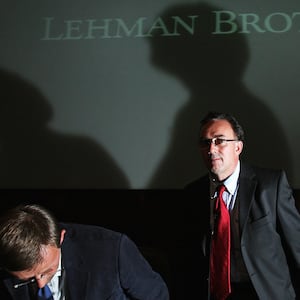Back in the fall of 2008, as the financial world was falling apart, investors and financial journalists grew accustomed to a weird weekly dance. On Sundays, the White House would convene a meeting or some conference calls, and assure everyone that, yes, things were scary but plans were in place, and Great Financial Minds would sort things out.
Later, when the Obama team took over, Treasury Secretary Tim Geithner rather famously cajoled bank CEOs into buying other banks to avert even more financial disaster. The key was often doing it before the markets opened, trying to avert any perception of a bank run.
And, crucially, everyone seemingly working from the same playbook.
Fast-forward 10 bumpy years to this Sunday, when Treasury Secretary Steven Mnuchin tweeted one of the more baffling public statements in recent financial history. He had spoken with the heads of the big banks, he said, and noted that none had experienced “any clearance or margin issues.” Money-speak for, “everyone is fine and there is plenty of cash.”
It’s what you say to try and restore confidence during a bank run. Except there isn’t one.
The panic right now seems to come not from the market—which is indeed operating so far as it should—but from the treasury secretary, responding to the president.
“Right now, we don’t have a problem, per se,” said Julia Coronado, an economist and the head of MacroPolicy Perspectives. “Mostly it looks like the market itself is correcting.”
It’s a somewhat ugly correction; with the S&P entering a bear market and the Dow down 2.9 percent for its worst Christmas Eve trading day. And yet it makes some sense. Global growth has slowed down, the U.K. still can’t seem to figure out Brexit, and markets are starting to realize that a Democratically controlled House (whenever the government actually opens again) could mean increased taxes and more regulation.
But using the 2008 template in this environment may have actually made things worse, creating an air of crisis where one didn’t exist, and risking the administration’s credibility with the financial system should things get worse.
“Mnuchin is just play-acting his role as the Treasury Secretary,” said George Pearkes, a global macro strategist at Bespoke Investment. “It looks like he was instructed to go out and do something, and he jumped on the first thing he thought of.” Moreover, Mnuchin’s attempt to calm things down only highlighted one person he can’t control—his boss.
The U.S. economy is in fundamentally good shape, with employment, consumer confidence and the bond market all still signaling strength. “The odds that this metastasizes into a broader contraction where the average person has to worry about losing their job, I just don’t see it happening,” Pearkes said.
But President Trump is tweeting as if institutions are coming apart at the seams. Especially when he attacks the Federal Reserve and chairman Jerome (Jay) Powell, his own appointee.
Federal Reserve independence has taken on an almost talismanic quality in the past 50 years, as the financial system became more sophisticated and the global economy more interconnected. Yes, Lyndon Johnson shoved then chair William McChesney Martin against a wall, and Richard Nixon pushed Arthur Burns to ease interest rates before the 1972 election, but open criticism of a chair from a sitting president is extremely rare. Indeed, in the 2008-09 financial crisis, the Bush and Obama administrations were exceptionally careful in how they spoke about the Fed.
President Trump’s tweets about Powell are especially bizarre because none of the Fed’s moves has been a surprise. The Federal Open Market Committee has consistently telegraphed that it would raise interest rates and when it would proceed. “I mean, what did he talk to Powell about before he made him chairman?” asked Austan Goolsbee, who ran President Obama’s Council of Economic Advisers. “What did you think was going happen?”
In economics as well as politics, perception can help drive reality. There is a risk that Trump’s behavior, not any point of economic data, could cause more fundamental destabilization than a market selloff.
“The president is undermining the Fed,” said Coronado, “and that’s a scary thing to see. I think this whole environment is doing damage to institutions more broadly.”
Goolsbee was more sanguine. “This is a major gaffe by this secretary and it’s an imprudent statement by the president, but just these alone don’t seem like they would start a permanent crisis. Should you freak out that the Dow is falling? No.”
But the administration could be running out of room to maneuver should something more dire happen—a contraction in credit markets, or a loss of business confidence. Goolsbee cited his mentor, former Fed Chairman Paul Volcker, saying “in a crisis, all you have is your credibility.”
Something the last few days haven’t helped at all.






